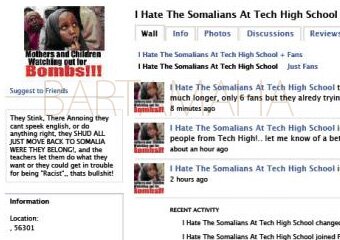 by Ambar Espinoza St. Cloud, Minn. — The Facebook group, “I hate the Somalians at Tech High,” didn’t live online for a long time, but word traveled fast among high school students in the St. Cloud area.
by Ambar Espinoza St. Cloud, Minn. — The Facebook group, “I hate the Somalians at Tech High,” didn’t live online for a long time, but word traveled fast among high school students in the St. Cloud area.
Sahra Alin Ahmed, a Somali student and freshman at Apollo High School, wasn’t surprised by the group’s views as she regularly hears them on campus.
The atmosphere at the city’s high schools is so hostile to Somali students that Alin Ahmed finds herself having to stand up for newly arrived immigrant students.
“They don’t say anything to the people that know English, but the ones who just came from Africa, who don’t really know English, you know, who don’t really understand, those are the ones they get at most,” she said.
Somali students now make up about 10 percent of the student population in the St. Cloud Area School District 742 and their numbers have been steadily growing. The entire district has about 10,000 students.
Alin Ahmed said white students make disparaging remarks about how they perceive their Muslim classmates to dress, speak, and smell.
Apollo sophomore Fadumo Adan said she’s been the target of those comments ever since she moved to Minnesota from Somalia two years ago.
“They always make fun of us and they say, ‘Go back to your countries,’ and, ‘You guys stink,’ and, ‘This is our country, and we don’t need black people,’ so it’s every single day,” Adan said. “It’s not several times, it’s all the time.”
Adan said some of her classmates spray perfume as Muslim students exit classrooms. Although she has complained about that to teachers and her counselor, sometimes they won’t do anything, she said.
But Alin Ahmed said that in her experience, school administrators do try to address racial tensions when problems arise.
St. Cloud Area School District 742 Superintendent Steve Jordahl said school administrators do follow district discipline policies when students report any kind of inappropriate behavior. When district officials receive complaints of bullying, racial, sexual or religious harassment, he said, they take action.
“Detention can happen [and] legal authority, the police, in other words, can be called in,” Jordahl said. “Kids can be suspended or dismissed from school. Sometimes expulsion things can happen. Of course, that doesn’t happen very often, but it does happen.”
That’s what happened to 18-year-old Kyle Adams, a senior at Area Learning Center Wilson, an alternative school. Adams used to go to Technical High School, but officials expelled him when he was in the tenth grade.
“I was young and dumb and saying some stuff and then a Somalian came up at swung at me and I ducked out of the way and then I said, ‘you stupid, f’ing n—– and all of this,’” Adams said. “And then I got in trouble and got kicked out and there was nothing followed up on them for swinging at me or yelling at me and that really made me kind of mad.”
This wasn’t Adams’ first altercation with classmates of Somali descent.
 Though Adams now says he shouldn’t have said the things he said, he still harbors resentment. He was one of the people who joined the Facebook group, “I hate the Somalians at Tech High.” He’s also a member of another Facebook group called, “I am a ‘Rasist’ [sic].. ok,, So Deal With It.”
Though Adams now says he shouldn’t have said the things he said, he still harbors resentment. He was one of the people who joined the Facebook group, “I hate the Somalians at Tech High.” He’s also a member of another Facebook group called, “I am a ‘Rasist’ [sic].. ok,, So Deal With It.”
Adams, who grew up in Kentucky, explains he called his classmate a racial epithet because his beliefs about race are deep-seated.
“I was raised in believing that this country was founded upon a white Christian nation and the belief of racial separation,” he said.
Adams said his family and friends think it’s normal to use racial slurs. He said his attitude toward Muslim students is also common among many of his classmates.
His friend, 18-year-old Matt Mayavski, said a few people at the school call themselves “rednecks” on campus. Others make their views known by wearing Confederate flag belt buckles or belts or wearing certain brands of clothing, said Mayavski, a lifelong St. Cloud resident who also went to Technical High School.
Adams and Mayavski say they flash the Confederate battle flag — an offensive symbol to many blacks — because they believe in small government. They say it has nothing to do with race.
The resentment stems from feeling like Muslim students receive preferential treatment, Mayavski said.
“Towards the end of my junior year, I was in math class and the Somalians asked to go pray before lunch,” he said. “Well, I went to ask my teacher for [a prayer break] and [she] sent me down to the office and I got written up for it. And I was like, ‘Well, how can the school respect their religion, but they can’t respect ours?’”
Nimco Ahmed, a policy aide to a Minneapolis City Council member, said it’s understandable that white students in St. Cloud have such questions.
“Why can they go every Friday and step out of class and have a Friday prayer while I have to be in class is a good question,” said Ahmed, who is from Somalia. “It is a legitimate question and somebody needs to answer these questions to them.”
When Ahmed went to Roosevelt High School in Minneapolis ten years ago, the Somali population was growing rapidly, and cultural misunderstandings were common.
Ahmed said school administrators have to take extra steps to educate students about other cultures. That’s how her school was able to overcome cultural tensions.
“They reached out to other people outside of our school. They had people come in and educate us and sit down with us and mediate us,” she said. “That’s exactly what is needed. And when we learned how to do it, we reached out to other schools that had the same problems. We didn’t stop.”
Ahmed said such challenges are typical of any area undergoing significant demographic changes. But the issues at St. Cloud schools need to be addressed quickly before they escalate, she said.
Superintendent Jordahl said he wants people to understand that his schools are doing what they can to address these problems.
“As adults in the system, we recognize that the issues exist and our job is to raise student achievement,” Jordahl said. “We recognize that if kids don’t feel good, feel safe, they are not going to do as well as if they did. So we want to make sure we are addressing this all the time.”
But schools can’t tackle them alone, he said.
“We really, really want our parents to understand that they have a huge role in this,” Jordahl said. “In fact, I always say this, parents, you are the first and most important teacher your child has.”
While Jordahl said St. Cloud schools are working hard to address racial tensions, critics in the wider St. Cloud community say the district isn’t doing enough. They’ve called on the district to adopt a more aggressive anti-bias curriculum than what the district currently has.
______
Source: minnesota.publicradio.org






